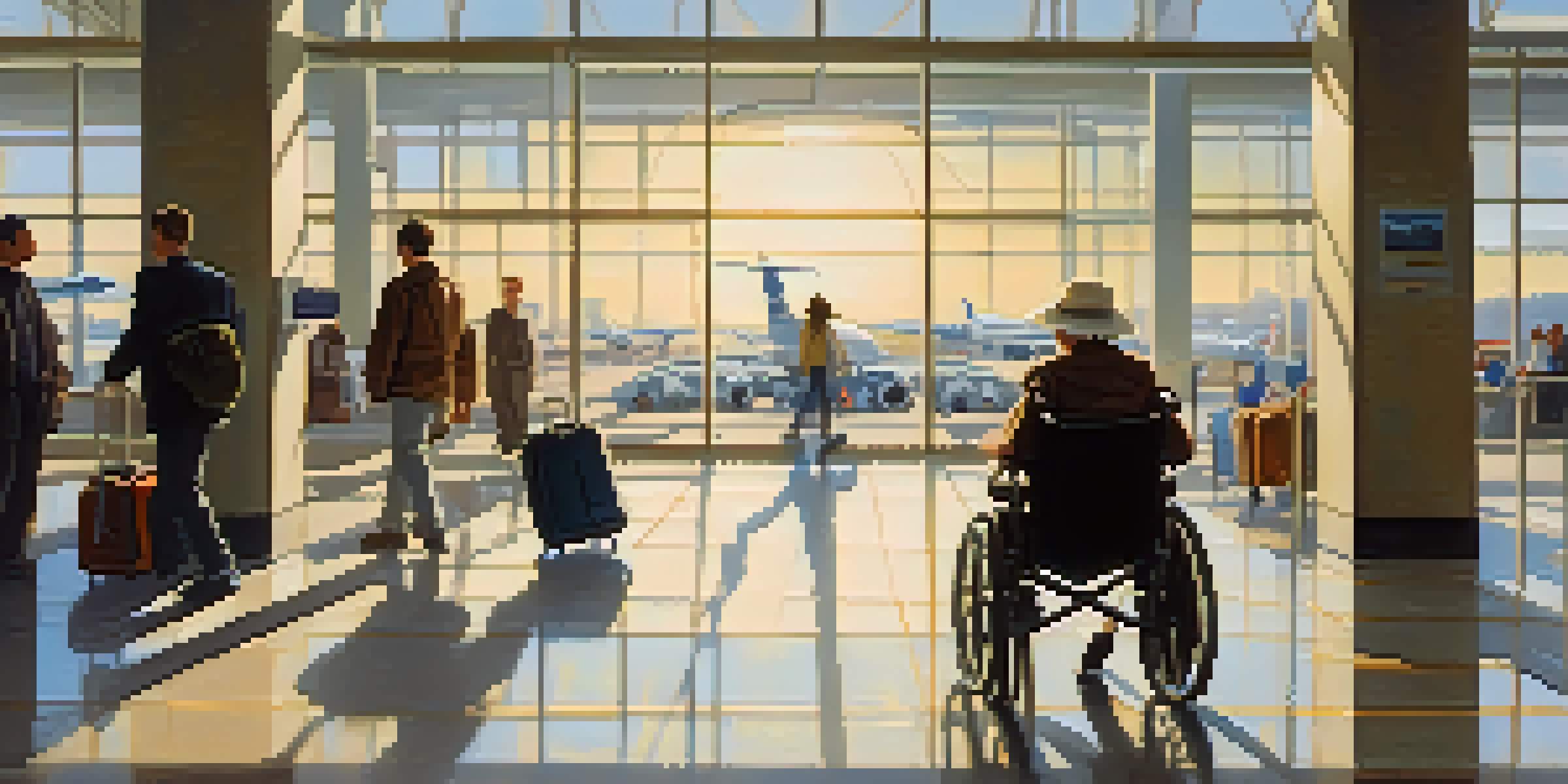Essential Travel Amenities for Travelers with Mobility Issues

Understanding Mobility Challenges in Travel
Traveling can be an exciting adventure, but for individuals with mobility issues, it can present unique challenges. These challenges can range from navigating airports to accessing public transport, which can sometimes feel overwhelming. Understanding these hurdles is the first step in ensuring a smoother travel experience.
Traveling – it leaves you speechless, then turns you into a storyteller.
Mobility challenges can vary widely; some travelers may use wheelchairs, while others might rely on canes or have difficulty standing for long periods. Recognizing these differences allows families, friends, and travel providers to cater more effectively to each person's needs. This understanding fosters a supportive environment for all travelers.
Ultimately, acknowledging mobility issues in travel isn’t just about accessibility; it's about inclusivity. By creating a more inclusive travel culture, we can ensure that everyone can explore the world with confidence and comfort.
Essential Mobility Aids for Traveling
When it comes to traveling with mobility issues, having the right aids can make a world of difference. Common mobility aids include wheelchairs, walkers, and mobility scooters, all designed to boost independence. Selecting the right aid based on individual needs is crucial for a more enjoyable travel experience.

Many travelers prefer lightweight, foldable options that are easy to transport. For example, some wheelchairs can be folded to fit into car trunks or under airplane seats, which is a game-changer for those on the go. Additionally, portable ramps can assist in navigating curbs and other obstacles, making places more accessible.
Understanding Mobility Challenges
Recognizing the unique hurdles faced by travelers with mobility issues is essential for fostering an inclusive travel environment.
Investing in quality mobility aids not only enhances comfort but also promotes a sense of freedom while traveling. With the right equipment, travelers can focus on enjoying their journey rather than worrying about physical limitations.
Choosing Accessible Accommodations
Selecting the right accommodation is a key aspect of travel for those with mobility issues. Many hotels now offer rooms specifically designed for accessibility, featuring wider doorways, grab bars, and roll-in showers. It's essential to research and choose facilities that meet specific needs for a comfortable stay.
The journey of a thousand miles begins with one step.
Online platforms often allow users to filter search results based on accessibility features, making it easier to find suitable options. For instance, looking for accommodations with ground-level access or elevators can significantly enhance the travel experience. Reading reviews from fellow travelers can also provide insights into the actual accessibility of a hotel.
Remember that accessibility goes beyond just the room itself; consider the layout of the hotel and its surrounding areas. A hotel with easy access to restaurants, shops, and attractions can significantly improve the overall experience, allowing travelers to explore without unnecessary stress.
Navigating Transportation Options
Transportation can pose significant challenges for travelers with mobility issues, making it essential to plan ahead. Many cities offer accessible public transportation options, including buses and trains equipped with ramps and designated seating. Knowing the available options beforehand can ease anxiety and enhance comfort while traveling.
For those flying, it's vital to notify airlines about mobility needs when booking tickets. Most airlines provide assistance, such as wheelchair services and priority boarding, ensuring travelers can navigate the airport with ease. Getting to and from the airport can also be simplified by using rideshare services with accessible vehicles.
Essential Mobility Aids for Travel
Having the right mobility aids can significantly enhance independence and comfort for travelers with mobility challenges.
Ultimately, understanding transportation options and planning accordingly can lead to a seamless travel experience. With the right preparations, travelers can minimize stress and enjoy their journey to the fullest.
Packing Smart: Mobility Essentials
When traveling with mobility issues, packing smart is essential to ensure a smooth trip. Start by bringing along any necessary mobility aids, as well as backup supplies like spare batteries for electric scooters. Additionally, packing items like comfortable shoes and clothing that’s easy to put on can make a significant difference in comfort levels.
It's also wise to include handy tools such as a portable charger for devices, as well as travel-sized medical supplies. Having these essentials on hand can save time and reduce stress during travel. Consider using packing cubes to keep items organized and easily accessible.
Lastly, always remember to carry important documents, such as medical information and insurance details. Keeping these documents handy can provide peace of mind while navigating new environments and ensure that assistance can be readily available if needed.
Utilizing Technology for Enhanced Accessibility
Technology has revolutionized travel for everyone, including those with mobility issues. There are numerous apps designed to assist in finding accessible routes and accommodations, making planning easier than ever. For example, apps like Wheelmap can help users locate wheelchair-friendly locations in cities around the world.
In addition to navigation apps, tech devices like portable ramps and mobility scooters have become more advanced and user-friendly. Many modern scooters are equipped with features such as GPS, allowing travelers to explore new places with confidence. Embracing technology can enhance independence and provide more control over travel experiences.
Advocacy for Inclusive Travel
Raising awareness and advocating for accessibility can lead to positive changes in the travel industry, benefiting all travelers.
Staying connected through technology also allows travelers to share their experiences and gather tips from others who have similar mobility challenges. Online communities and social media platforms serve as fantastic resources for advice and support, fostering a sense of camaraderie among travelers.
The Importance of Advocacy and Awareness
Advocacy plays a vital role in improving travel experiences for individuals with mobility issues. By raising awareness about accessibility needs, travelers can help influence positive changes in the travel industry. This includes encouraging businesses to enhance their facilities and services to accommodate everyone.
Sharing personal experiences can also educate others about the barriers faced while traveling. Whether it's through social media, blogs, or community forums, spreading awareness helps create a more inclusive travel environment. The more stories shared, the greater the understanding of mobility challenges.

Ultimately, advocacy is about fostering change. By working together, travelers can inspire destinations to become more accessible, ensuring that everyone has the opportunity to explore and enjoy the world.